Exploring Management Theories: A Critical Review and Real-World Case
VerifiedAdded on 2023/06/11
|16
|2012
|494
Report
AI Summary
This report critically examines real-world management through the application of Mintzberg's management theory, focusing on distributing organizational work and practical experience. It contrasts Mintzberg's approach with Henri Fayol's administrative management theory, evaluating both through positivist and qualitative research paradigms. The analysis incorporates interview transcripts to provide practical insights into management challenges and satisfaction levels in the workplace. Furthermore, the report explores various management theories, including Scientific, Administrative, Bureaucratic, Human Relations, Systems, and X&Y Theories, to provide a comprehensive overview. The conclusion emphasizes the importance of management theories in effective decision-making and recommends their practical application in real-time management situations. Desklib provides access to this assignment and many other resources for students.
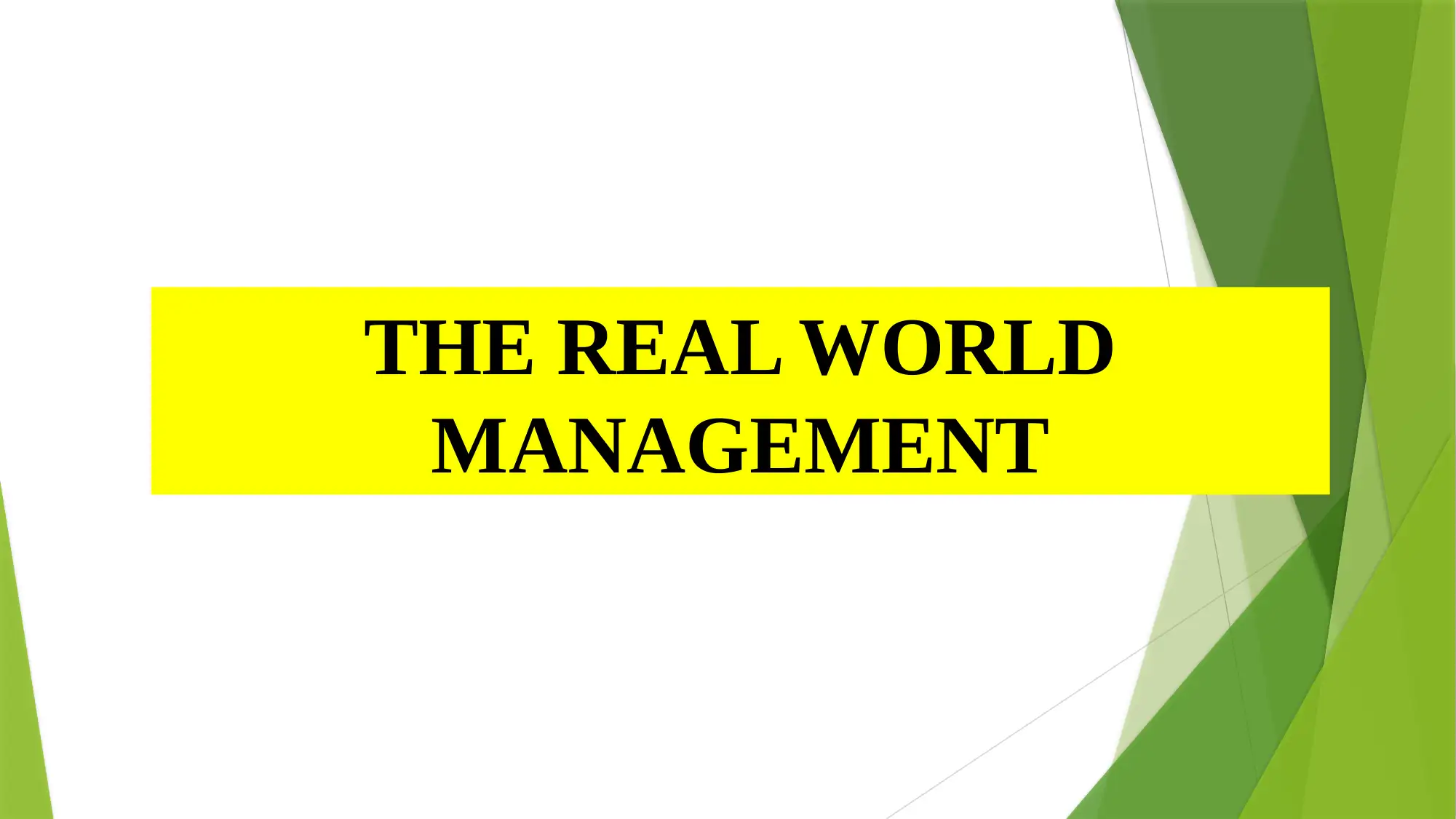
THE REAL WORLD
MANAGEMENT
MANAGEMENT
Paraphrase This Document
Need a fresh take? Get an instant paraphrase of this document with our AI Paraphraser
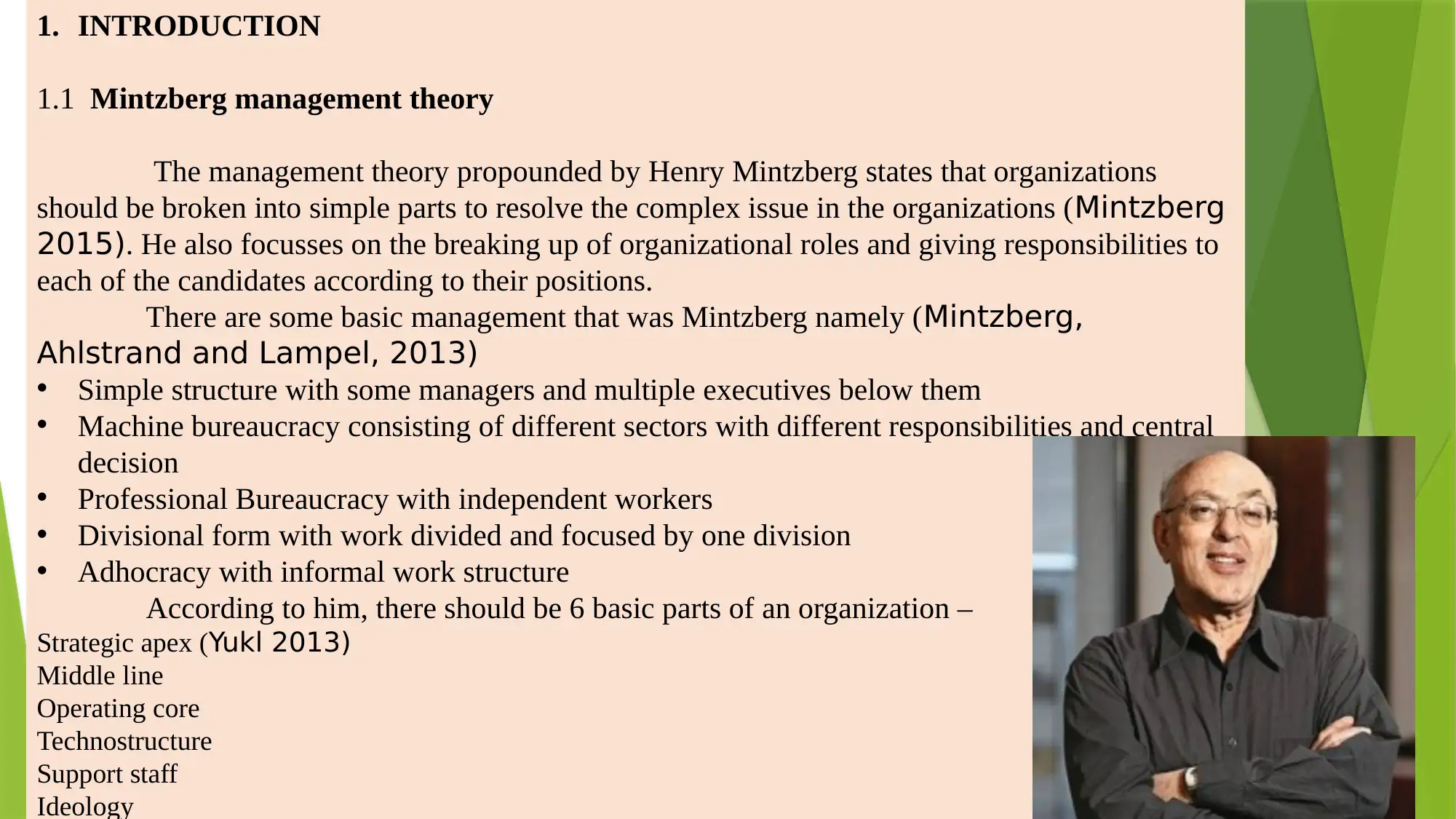
1. INTRODUCTION
1.1 Mintzberg management theory
The management theory propounded by Henry Mintzberg states that organizations
should be broken into simple parts to resolve the complex issue in the organizations (Mintzberg
2015). He also focusses on the breaking up of organizational roles and giving responsibilities to
each of the candidates according to their positions.
There are some basic management that was Mintzberg namely (Mintzberg,
Ahlstrand and Lampel, 2013)
• Simple structure with some managers and multiple executives below them
• Machine bureaucracy consisting of different sectors with different responsibilities and central
decision
• Professional Bureaucracy with independent workers
• Divisional form with work divided and focused by one division
• Adhocracy with informal work structure
According to him, there should be 6 basic parts of an organization –
Strategic apex (Yukl 2013)
Middle line
Operating core
Technostructure
Support staff
Ideology
1.1 Mintzberg management theory
The management theory propounded by Henry Mintzberg states that organizations
should be broken into simple parts to resolve the complex issue in the organizations (Mintzberg
2015). He also focusses on the breaking up of organizational roles and giving responsibilities to
each of the candidates according to their positions.
There are some basic management that was Mintzberg namely (Mintzberg,
Ahlstrand and Lampel, 2013)
• Simple structure with some managers and multiple executives below them
• Machine bureaucracy consisting of different sectors with different responsibilities and central
decision
• Professional Bureaucracy with independent workers
• Divisional form with work divided and focused by one division
• Adhocracy with informal work structure
According to him, there should be 6 basic parts of an organization –
Strategic apex (Yukl 2013)
Middle line
Operating core
Technostructure
Support staff
Ideology
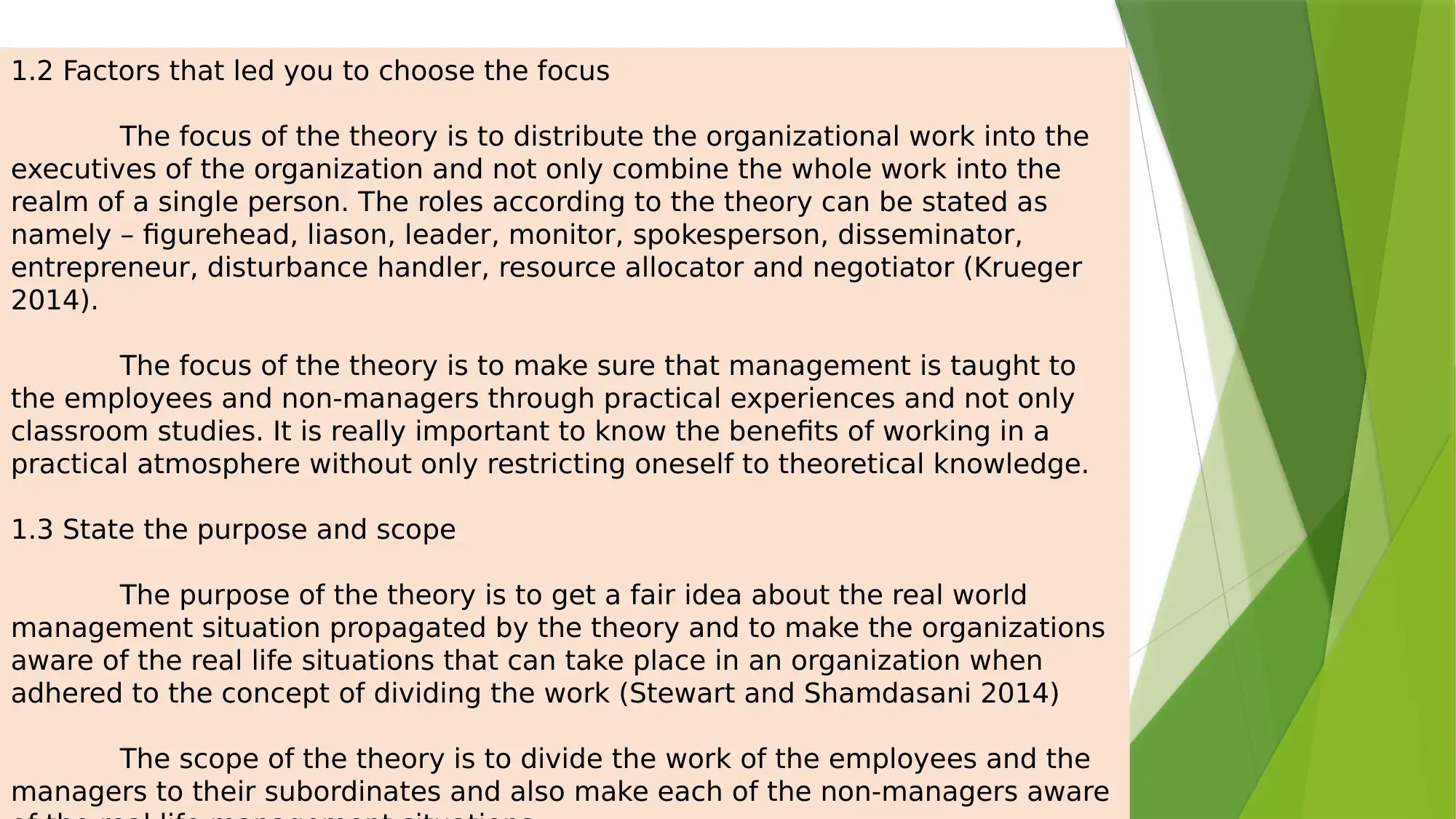
1.2 Factors that led you to choose the focus
The focus of the theory is to distribute the organizational work into the
executives of the organization and not only combine the whole work into the
realm of a single person. The roles according to the theory can be stated as
namely – figurehead, liason, leader, monitor, spokesperson, disseminator,
entrepreneur, disturbance handler, resource allocator and negotiator (Krueger
2014).
The focus of the theory is to make sure that management is taught to
the employees and non-managers through practical experiences and not only
classroom studies. It is really important to know the benefits of working in a
practical atmosphere without only restricting oneself to theoretical knowledge.
1.3 State the purpose and scope
The purpose of the theory is to get a fair idea about the real world
management situation propagated by the theory and to make the organizations
aware of the real life situations that can take place in an organization when
adhered to the concept of dividing the work (Stewart and Shamdasani 2014)
The scope of the theory is to divide the work of the employees and the
managers to their subordinates and also make each of the non-managers aware
The focus of the theory is to distribute the organizational work into the
executives of the organization and not only combine the whole work into the
realm of a single person. The roles according to the theory can be stated as
namely – figurehead, liason, leader, monitor, spokesperson, disseminator,
entrepreneur, disturbance handler, resource allocator and negotiator (Krueger
2014).
The focus of the theory is to make sure that management is taught to
the employees and non-managers through practical experiences and not only
classroom studies. It is really important to know the benefits of working in a
practical atmosphere without only restricting oneself to theoretical knowledge.
1.3 State the purpose and scope
The purpose of the theory is to get a fair idea about the real world
management situation propagated by the theory and to make the organizations
aware of the real life situations that can take place in an organization when
adhered to the concept of dividing the work (Stewart and Shamdasani 2014)
The scope of the theory is to divide the work of the employees and the
managers to their subordinates and also make each of the non-managers aware
⊘ This is a preview!⊘
Do you want full access?
Subscribe today to unlock all pages.

Trusted by 1+ million students worldwide
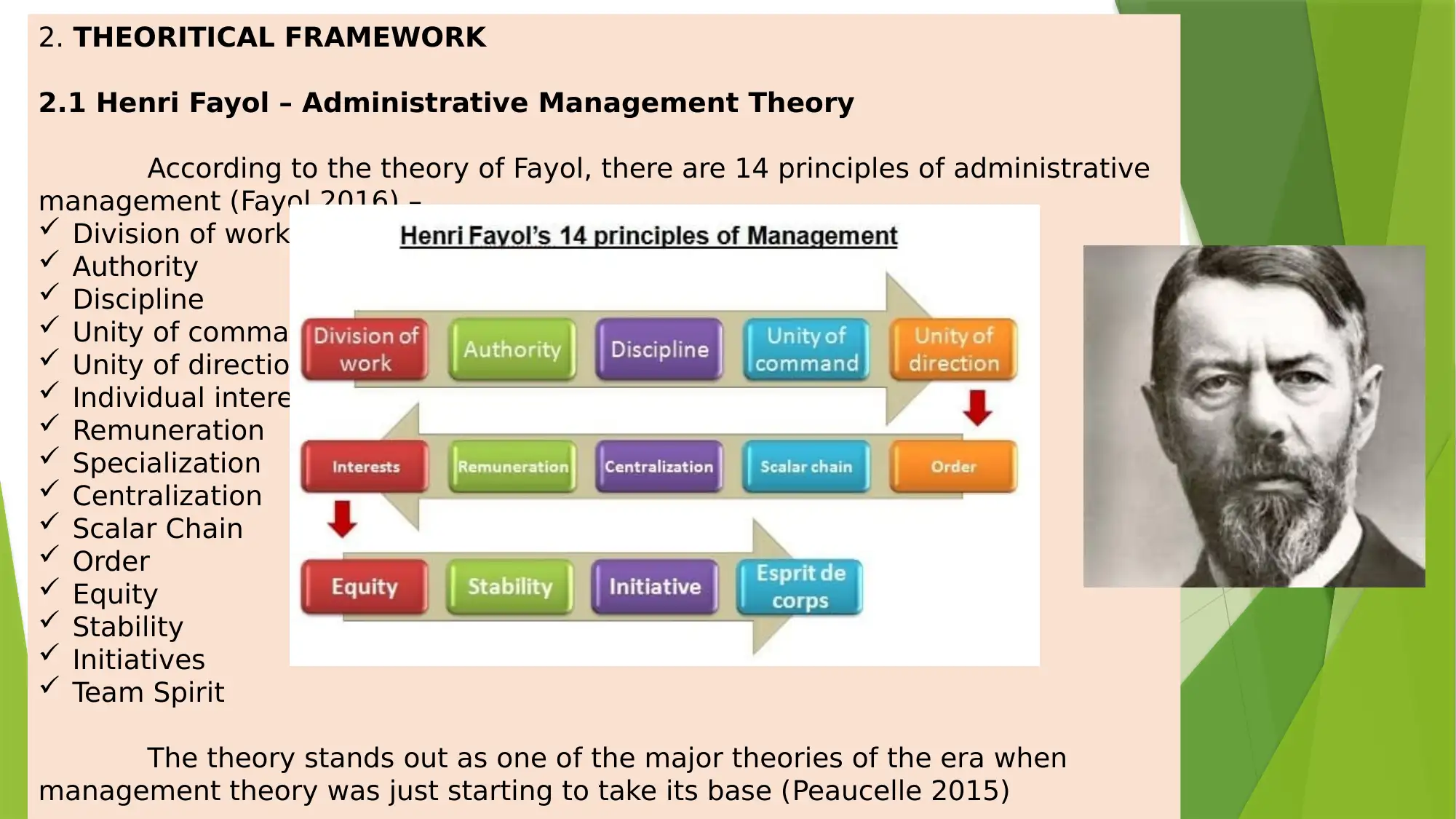
2. THEORITICAL FRAMEWORK
2.1 Henri Fayol – Administrative Management Theory
According to the theory of Fayol, there are 14 principles of administrative
management (Fayol 2016) –
Division of work
Authority
Discipline
Unity of command
Unity of direction
Individual interest
Remuneration
Specialization
Centralization
Scalar Chain
Order
Equity
Stability
Initiatives
Team Spirit
The theory stands out as one of the major theories of the era when
management theory was just starting to take its base (Peaucelle 2015)
2.1 Henri Fayol – Administrative Management Theory
According to the theory of Fayol, there are 14 principles of administrative
management (Fayol 2016) –
Division of work
Authority
Discipline
Unity of command
Unity of direction
Individual interest
Remuneration
Specialization
Centralization
Scalar Chain
Order
Equity
Stability
Initiatives
Team Spirit
The theory stands out as one of the major theories of the era when
management theory was just starting to take its base (Peaucelle 2015)
Paraphrase This Document
Need a fresh take? Get an instant paraphrase of this document with our AI Paraphraser
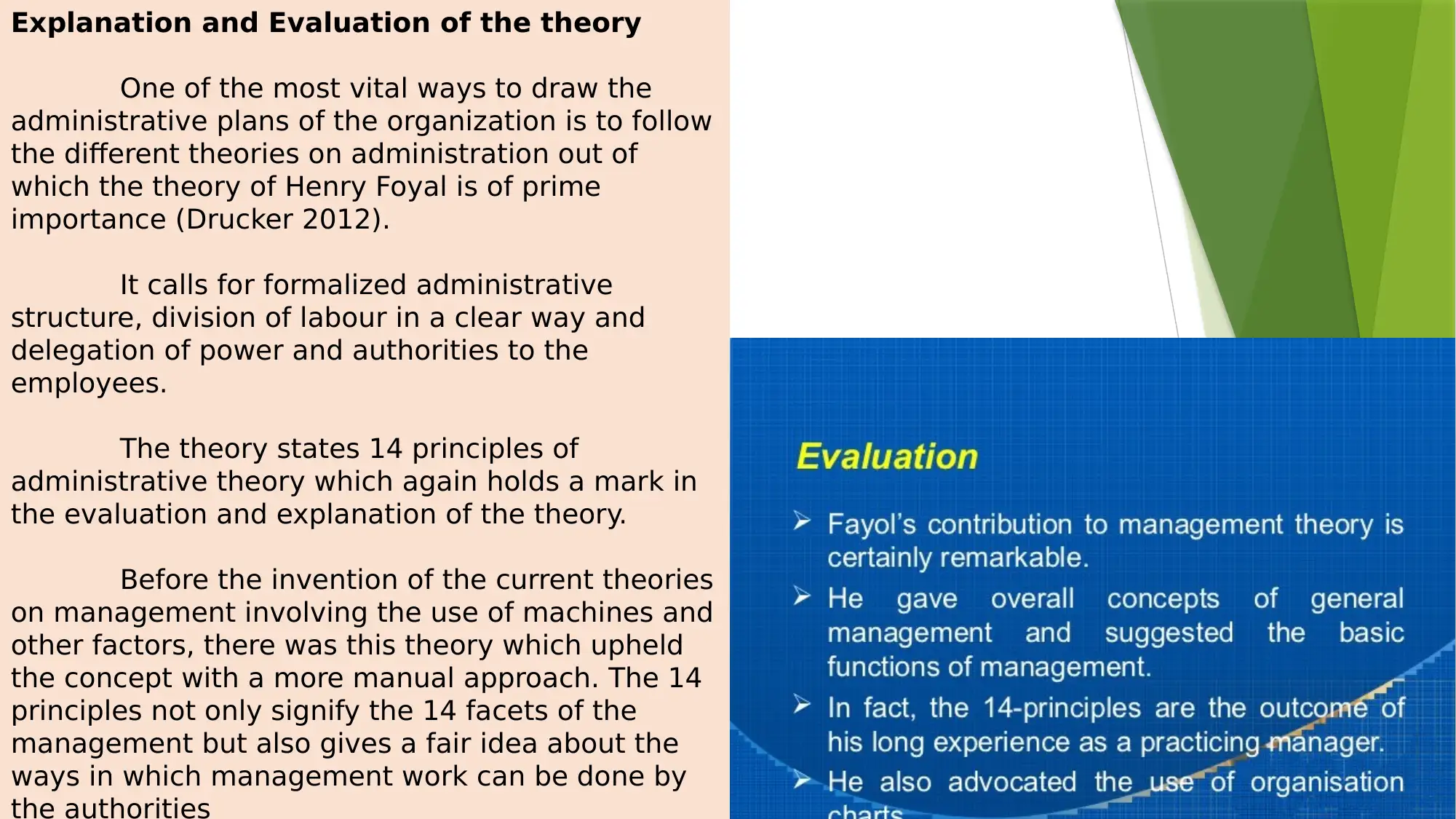
Explanation and Evaluation of the theory
One of the most vital ways to draw the
administrative plans of the organization is to follow
the different theories on administration out of
which the theory of Henry Foyal is of prime
importance (Drucker 2012).
It calls for formalized administrative
structure, division of labour in a clear way and
delegation of power and authorities to the
employees.
The theory states 14 principles of
administrative theory which again holds a mark in
the evaluation and explanation of the theory.
Before the invention of the current theories
on management involving the use of machines and
other factors, there was this theory which upheld
the concept with a more manual approach. The 14
principles not only signify the 14 facets of the
management but also gives a fair idea about the
ways in which management work can be done by
the authorities
One of the most vital ways to draw the
administrative plans of the organization is to follow
the different theories on administration out of
which the theory of Henry Foyal is of prime
importance (Drucker 2012).
It calls for formalized administrative
structure, division of labour in a clear way and
delegation of power and authorities to the
employees.
The theory states 14 principles of
administrative theory which again holds a mark in
the evaluation and explanation of the theory.
Before the invention of the current theories
on management involving the use of machines and
other factors, there was this theory which upheld
the concept with a more manual approach. The 14
principles not only signify the 14 facets of the
management but also gives a fair idea about the
ways in which management work can be done by
the authorities
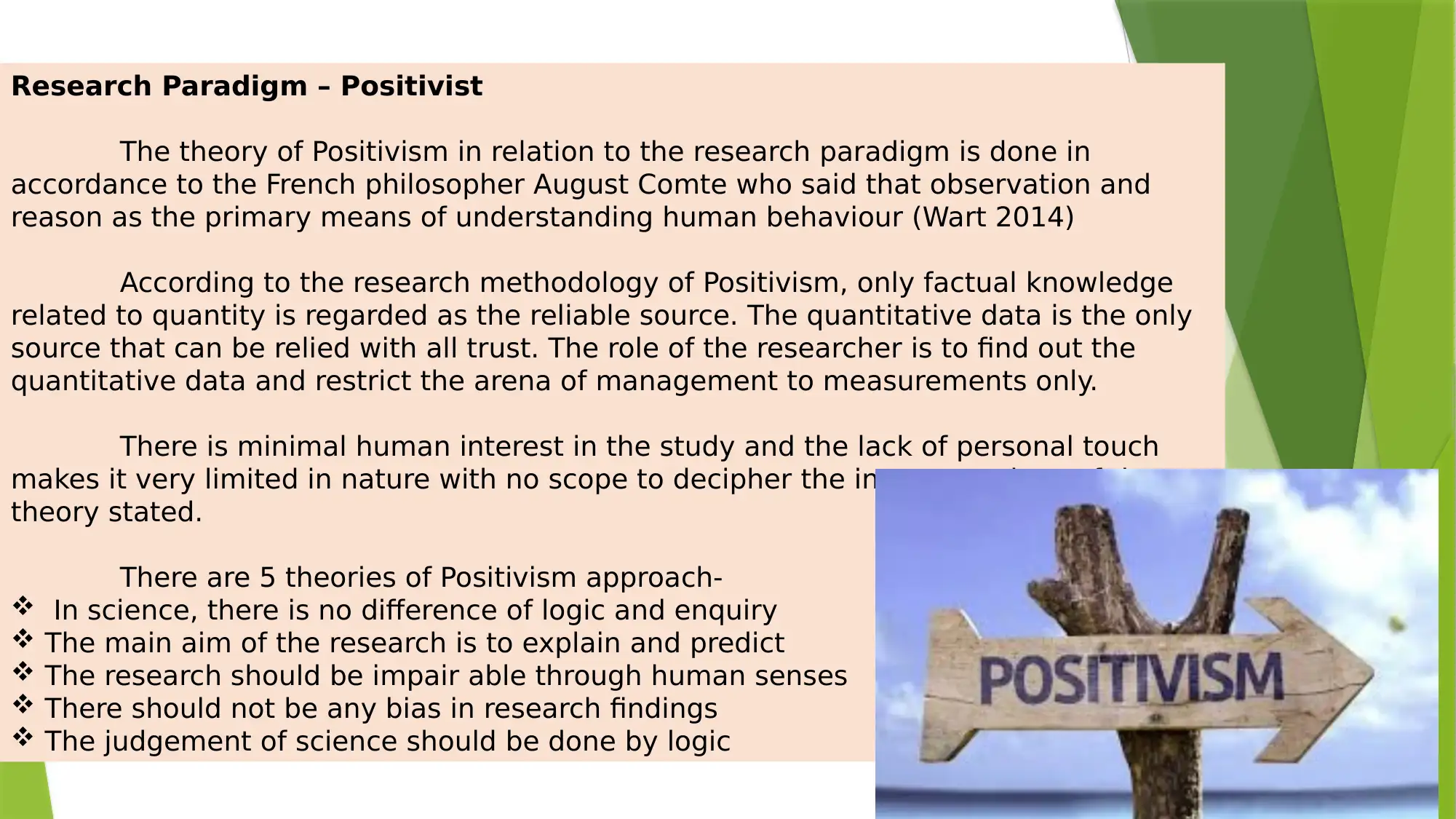
Research Paradigm – Positivist
The theory of Positivism in relation to the research paradigm is done in
accordance to the French philosopher August Comte who said that observation and
reason as the primary means of understanding human behaviour (Wart 2014)
According to the research methodology of Positivism, only factual knowledge
related to quantity is regarded as the reliable source. The quantitative data is the only
source that can be relied with all trust. The role of the researcher is to find out the
quantitative data and restrict the arena of management to measurements only.
There is minimal human interest in the study and the lack of personal touch
makes it very limited in nature with no scope to decipher the inner meanings of the
theory stated.
There are 5 theories of Positivism approach-
In science, there is no difference of logic and enquiry
The main aim of the research is to explain and predict
The research should be impair able through human senses
There should not be any bias in research findings
The judgement of science should be done by logic
The theory of Positivism in relation to the research paradigm is done in
accordance to the French philosopher August Comte who said that observation and
reason as the primary means of understanding human behaviour (Wart 2014)
According to the research methodology of Positivism, only factual knowledge
related to quantity is regarded as the reliable source. The quantitative data is the only
source that can be relied with all trust. The role of the researcher is to find out the
quantitative data and restrict the arena of management to measurements only.
There is minimal human interest in the study and the lack of personal touch
makes it very limited in nature with no scope to decipher the inner meanings of the
theory stated.
There are 5 theories of Positivism approach-
In science, there is no difference of logic and enquiry
The main aim of the research is to explain and predict
The research should be impair able through human senses
There should not be any bias in research findings
The judgement of science should be done by logic
⊘ This is a preview!⊘
Do you want full access?
Subscribe today to unlock all pages.

Trusted by 1+ million students worldwide
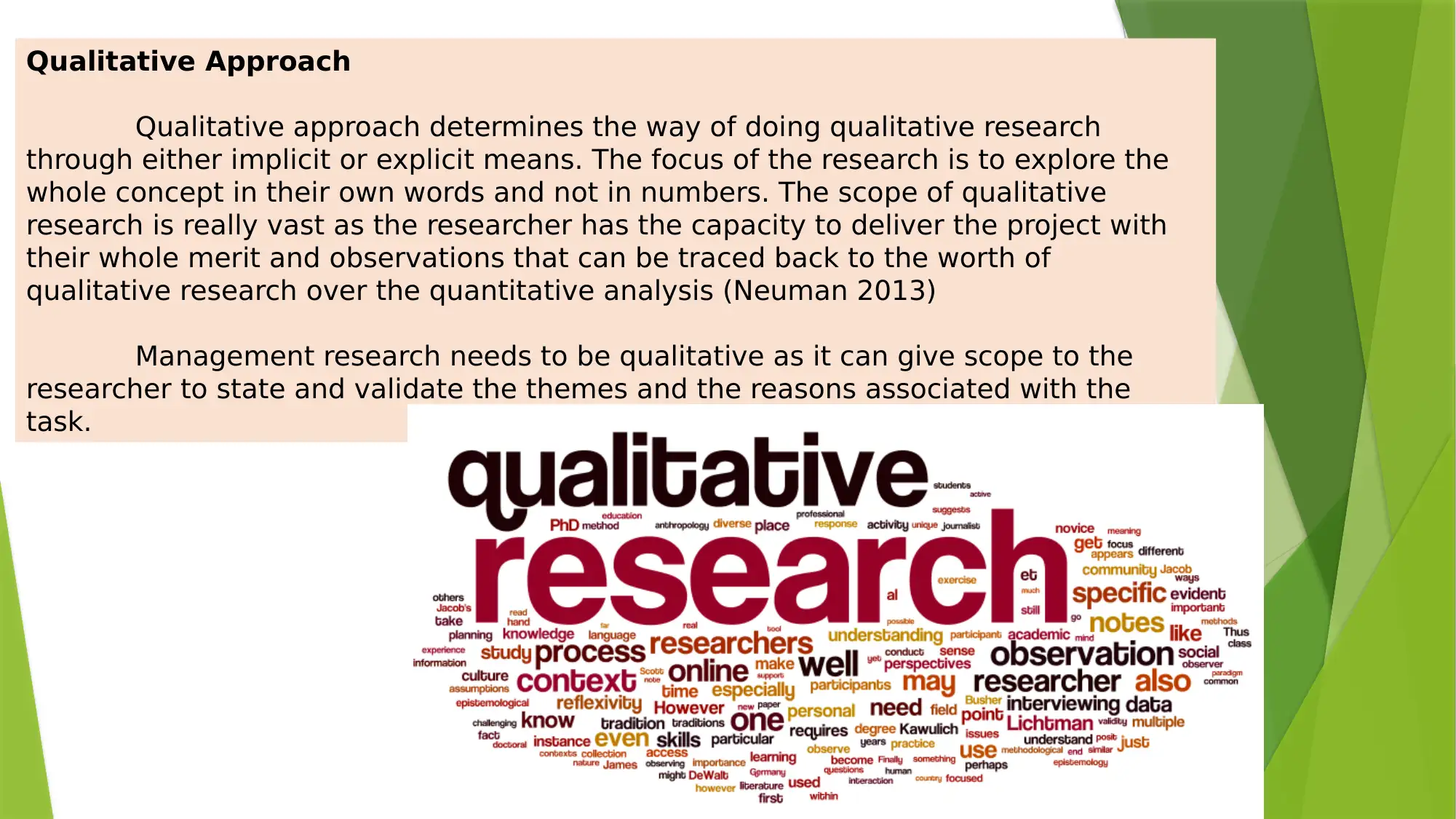
Qualitative Approach
Qualitative approach determines the way of doing qualitative research
through either implicit or explicit means. The focus of the research is to explore the
whole concept in their own words and not in numbers. The scope of qualitative
research is really vast as the researcher has the capacity to deliver the project with
their whole merit and observations that can be traced back to the worth of
qualitative research over the quantitative analysis (Neuman 2013)
Management research needs to be qualitative as it can give scope to the
researcher to state and validate the themes and the reasons associated with the
task.
Qualitative approach determines the way of doing qualitative research
through either implicit or explicit means. The focus of the research is to explore the
whole concept in their own words and not in numbers. The scope of qualitative
research is really vast as the researcher has the capacity to deliver the project with
their whole merit and observations that can be traced back to the worth of
qualitative research over the quantitative analysis (Neuman 2013)
Management research needs to be qualitative as it can give scope to the
researcher to state and validate the themes and the reasons associated with the
task.
Paraphrase This Document
Need a fresh take? Get an instant paraphrase of this document with our AI Paraphraser
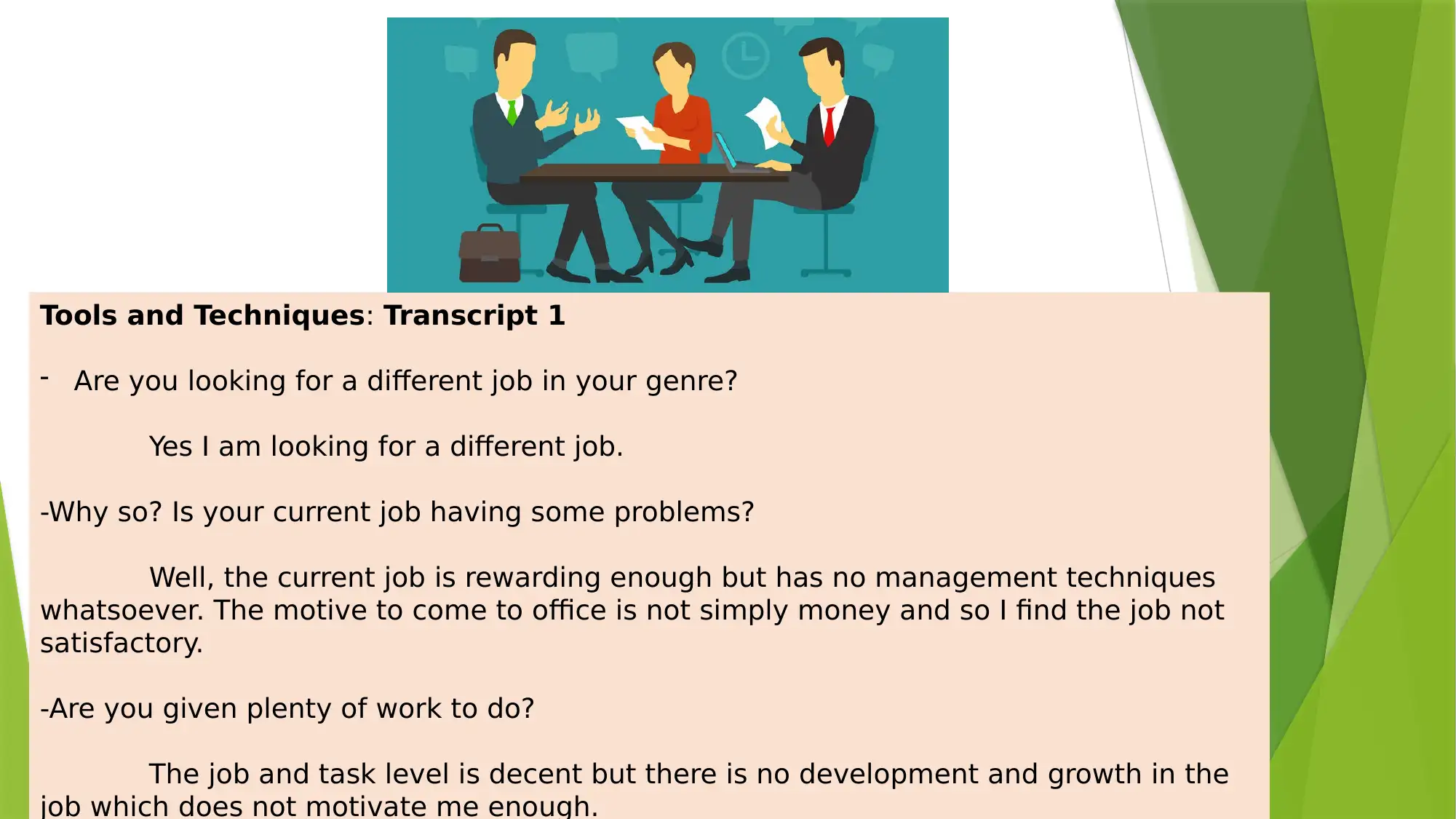
Tools and Techniques: Transcript 1
- Are you looking for a different job in your genre?
Yes I am looking for a different job.
-Why so? Is your current job having some problems?
Well, the current job is rewarding enough but has no management techniques
whatsoever. The motive to come to office is not simply money and so I find the job not
satisfactory.
-Are you given plenty of work to do?
The job and task level is decent but there is no development and growth in the
job which does not motivate me enough.
- Are you looking for a different job in your genre?
Yes I am looking for a different job.
-Why so? Is your current job having some problems?
Well, the current job is rewarding enough but has no management techniques
whatsoever. The motive to come to office is not simply money and so I find the job not
satisfactory.
-Are you given plenty of work to do?
The job and task level is decent but there is no development and growth in the
job which does not motivate me enough.

- Are you looking for a different job?: Transcript 2
No, I am not as I am totally satisfied with my current job.
- Has the current job any problems that you feel like sharing?
Like every company, my place has also some of the basic problems that can be
resolved with the efforts of the management and the company. The problems are
related to the management and task division but due to the tremendous efforts of the
management and authorities, the problem are being resolved at every level.
- What are your outlooks for the candidates who are taking this job as their main goal?
This is one of the most worker friendly environment to work with as the
management and the authorities know how to act with the employees at both
professional and personal level. The candidates looking for this job must consider
the positive side of the company with a perfect working management and a
professional approach towards work.
No, I am not as I am totally satisfied with my current job.
- Has the current job any problems that you feel like sharing?
Like every company, my place has also some of the basic problems that can be
resolved with the efforts of the management and the company. The problems are
related to the management and task division but due to the tremendous efforts of the
management and authorities, the problem are being resolved at every level.
- What are your outlooks for the candidates who are taking this job as their main goal?
This is one of the most worker friendly environment to work with as the
management and the authorities know how to act with the employees at both
professional and personal level. The candidates looking for this job must consider
the positive side of the company with a perfect working management and a
professional approach towards work.
⊘ This is a preview!⊘
Do you want full access?
Subscribe today to unlock all pages.

Trusted by 1+ million students worldwide

- Are you looking forward for a different job?: Transcript 3
At present no, I am not looking for any change in job as I am currently satisfied in
my job. I have no prominent issue at my workplace and whatever issue I am facing is
being resolved by the authorities within a stipulated period without any intervention from
the office employees
- Is there any problem with the organization you are currently working for?
There is hardly any problem in the in the organization I am currently working for.
I am really happy thank you.
- What are the changes that you will like to make?
Though the organization of the company has one of the best management
At present no, I am not looking for any change in job as I am currently satisfied in
my job. I have no prominent issue at my workplace and whatever issue I am facing is
being resolved by the authorities within a stipulated period without any intervention from
the office employees
- Is there any problem with the organization you are currently working for?
There is hardly any problem in the in the organization I am currently working for.
I am really happy thank you.
- What are the changes that you will like to make?
Though the organization of the company has one of the best management
Paraphrase This Document
Need a fresh take? Get an instant paraphrase of this document with our AI Paraphraser
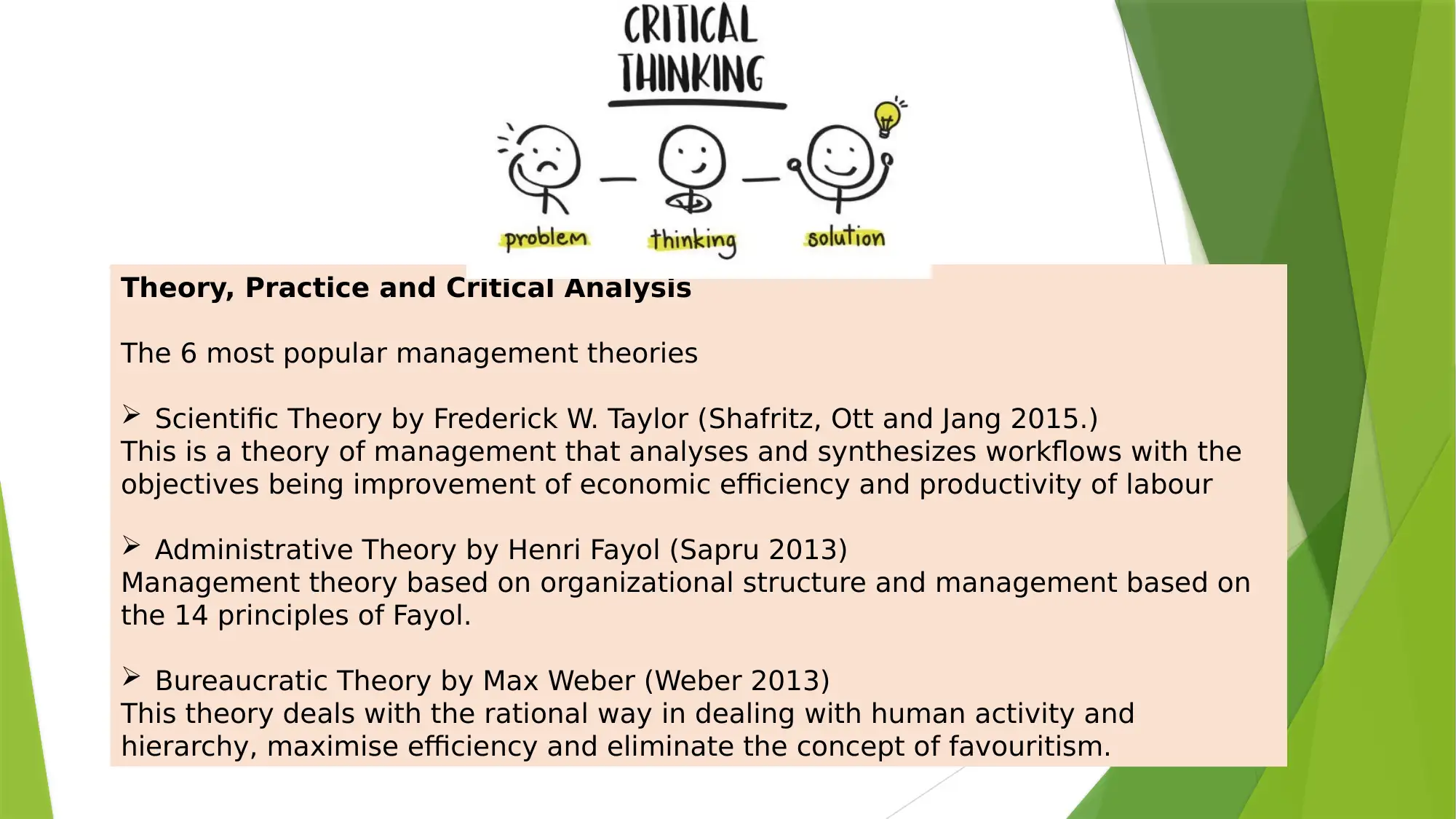
Theory, Practice and Critical Analysis
The 6 most popular management theories
Scientific Theory by Frederick W. Taylor (Shafritz, Ott and Jang 2015.)
This is a theory of management that analyses and synthesizes workflows with the
objectives being improvement of economic efficiency and productivity of labour
Administrative Theory by Henri Fayol (Sapru 2013)
Management theory based on organizational structure and management based on
the 14 principles of Fayol.
Bureaucratic Theory by Max Weber (Weber 2013)
This theory deals with the rational way in dealing with human activity and
hierarchy, maximise efficiency and eliminate the concept of favouritism.
The 6 most popular management theories
Scientific Theory by Frederick W. Taylor (Shafritz, Ott and Jang 2015.)
This is a theory of management that analyses and synthesizes workflows with the
objectives being improvement of economic efficiency and productivity of labour
Administrative Theory by Henri Fayol (Sapru 2013)
Management theory based on organizational structure and management based on
the 14 principles of Fayol.
Bureaucratic Theory by Max Weber (Weber 2013)
This theory deals with the rational way in dealing with human activity and
hierarchy, maximise efficiency and eliminate the concept of favouritism.
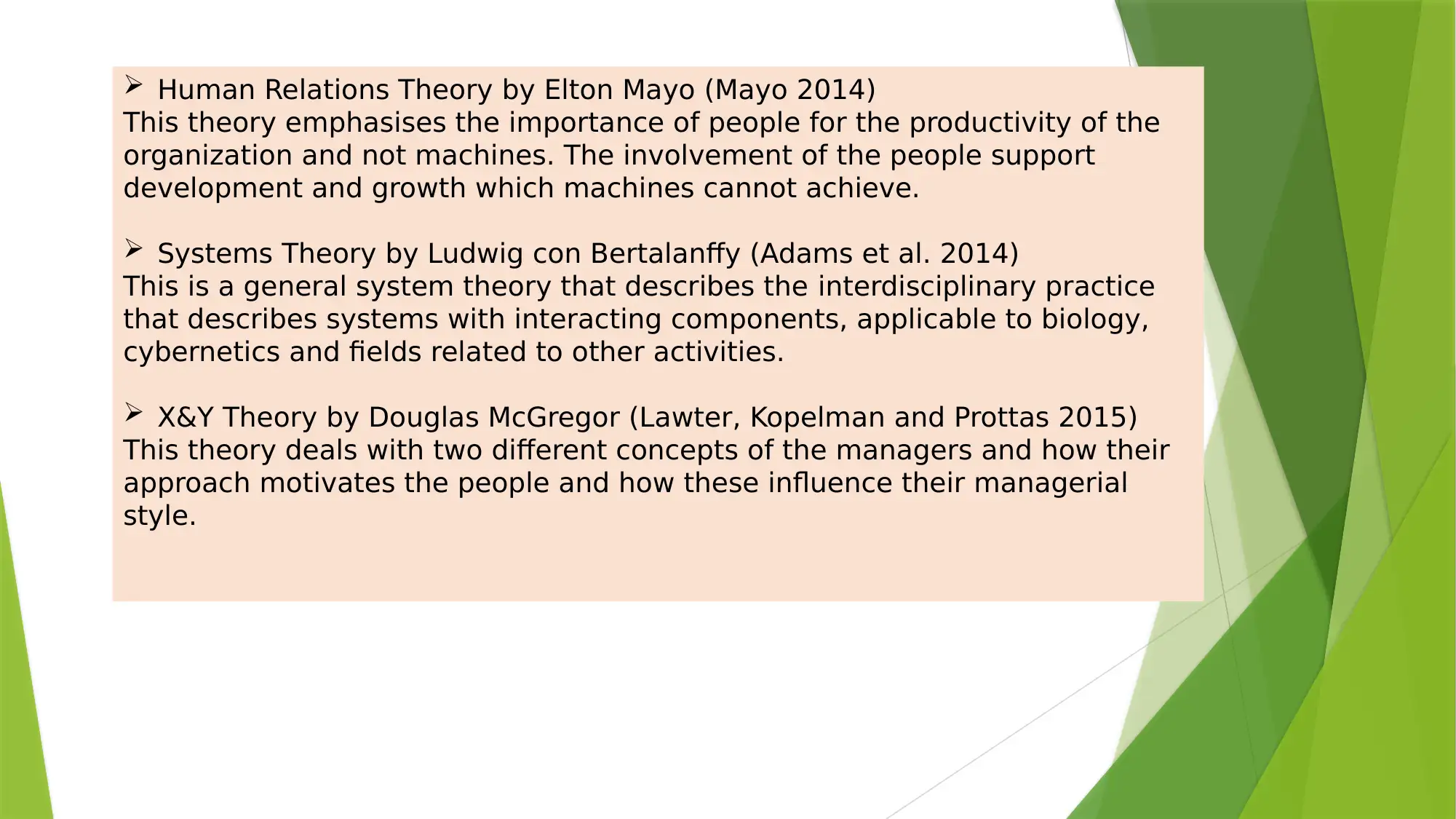
Human Relations Theory by Elton Mayo (Mayo 2014)
This theory emphasises the importance of people for the productivity of the
organization and not machines. The involvement of the people support
development and growth which machines cannot achieve.
Systems Theory by Ludwig con Bertalanffy (Adams et al. 2014)
This is a general system theory that describes the interdisciplinary practice
that describes systems with interacting components, applicable to biology,
cybernetics and fields related to other activities.
X&Y Theory by Douglas McGregor (Lawter, Kopelman and Prottas 2015)
This theory deals with two different concepts of the managers and how their
approach motivates the people and how these influence their managerial
style.
This theory emphasises the importance of people for the productivity of the
organization and not machines. The involvement of the people support
development and growth which machines cannot achieve.
Systems Theory by Ludwig con Bertalanffy (Adams et al. 2014)
This is a general system theory that describes the interdisciplinary practice
that describes systems with interacting components, applicable to biology,
cybernetics and fields related to other activities.
X&Y Theory by Douglas McGregor (Lawter, Kopelman and Prottas 2015)
This theory deals with two different concepts of the managers and how their
approach motivates the people and how these influence their managerial
style.
⊘ This is a preview!⊘
Do you want full access?
Subscribe today to unlock all pages.

Trusted by 1+ million students worldwide
1 out of 16
Related Documents
Your All-in-One AI-Powered Toolkit for Academic Success.
+13062052269
info@desklib.com
Available 24*7 on WhatsApp / Email
![[object Object]](/_next/static/media/star-bottom.7253800d.svg)
Unlock your academic potential
Copyright © 2020–2026 A2Z Services. All Rights Reserved. Developed and managed by ZUCOL.





